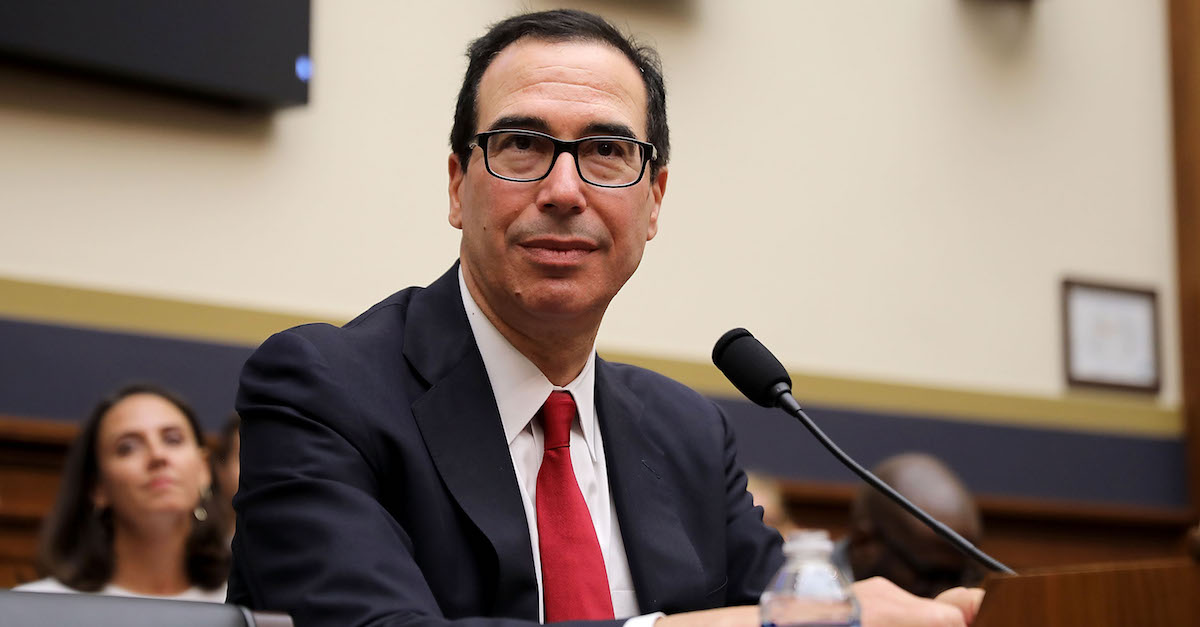
U.S. Treasury Secretary Steven Mnuchin said that House Democrats, led in this case by House Ways and Means Committee chairman Rep. Richard Neal (D-Mass.), lack a “legitimate legislative purpose” for demanding and obtaining President Donald Trump‘s tax returns.
Mnuchin wrote a letter to Neal on Monday that said the “Committee’s request is unprecedented, and it presents serious constitutional questions, the resolution of which may have lasting consequences for all taxpayers.” Mnuchin added that the “Supreme Court has held that the Constitution requires that Congressional information demands must reasonably serve a legitimate legislative purpose.”
University of Iowa Law Prof. Andy Grewal, a tax policy scholar, previously told Law&Crime that he was skeptical of Neal’s request and warned that broad request might fall short of “legitimate legislative purpose.”
“Neal states that the committee must determine whether the IRS audits Presidents. It seems doubtful that the committee needs all of a President’s tax returns to make that determination,” Grewal said. “Rather, the committee would be on firmer ground if it asked for documentation confirming that audit processes were followed or asked to speak to officials who oversee the audit process.”
“As the [Neal] letter hints, Congress has broad powers and they’re acting for proper purposes and usually the mental thoughts of the legislature don’t negate the validity of the inquiry, but the question here is, are they in fact pursing a legitimate purpose?” Grewal asked in a separate interview. “Generally, there are strong presumptions of Congress’ investigations, but that doesn’t mean it’s conclusive if they just say they need information.”
In other words, it seemed obvious from the start that this would be how Mnuchin would reply.
Neal claimed that the Committee was “considering legislative proposals and conducting oversight related to our Federal tax laws, including, but not limited to, the extent to which the IRS audits and enforces the Federal tax laws against a President.”
“Under the internal Revenue Manual, individual income tax returns of a President are subject to mandatory examination, but this practice is IRS policy and not codified in the Federal tax laws,” Neal added. “It is necessary for the Committee to determine the scope of any such examination and whether it includes a review of underlying business activities required to be reported on the individual income tax return.”
Neal numbered seven areas to be responsive to the request. These included: Trump’s 2013-2018 tax returns; tax returns of eight Trump-related entities (pictured below); statements about whether these tax returns are or were ever under audit (as Trump has repeatedly said in an effort not to release his personal tax returns); statements as to why there was an audit if there was one; all administrative files related to Trump and these entities; a statement in the event that Trump or these entities did not file tax returns last year.
Mnuchin said that he consulted the Department of Justice before responding to Neal’s request.
“In reliance on the advice of the Department of Justice, I have determined that the Committee’s request lacks a legitimate legislative purpose,” he said. “[T]he Department is therefore not authorized to disclose the requested returns and return information.”
Mnuchin also said that he was told that William Barr‘s DOJ “intends to memorialize its advice in a published legal opinion as soon as practicable.”
“Although the Department is unable to provide you with the requested confidential tax returns and return information, we renew our previous offer to provide informations concerning the Committee’s stated interest in how the IRS conducts mandatory examinations of Presidents, as provided by the Internal Revenue Manual,” Mnuchin concluded. “If the Committee is interested, we remain committed to providing such an accommodation.”
Chairman Neal previously wrote a letter to IRS Commissioner Charles Rettig, citing his authority pursuant to 26 U.S. Code § 6103(f). That said the following:
Upon written request from the chairman of the Committee on Ways and Means of the House of Representatives, the chairman of the Committee on Finance of the Senate, or the chairman of the Joint Committee on Taxation, the Secretary shall furnish such committee with any return or return information specified in such request, except that any return or return information which can be associated with, or otherwise identify, directly or indirectly, a particular taxpayer shall be furnished to such committee only when sitting in closed executive session unless such taxpayer otherwise consents in writing to such disclosure.
The Monday denial follows two missed deadlines.
Neal said he was aware of Mnuchin’s response but isn’t sure how to proceed just yet.
“Today, Secretary Mnuchin notified me that the IRS will not provide the documents I requested under Section 6103 of the Internal Revenue Code,” Neal said. “I will consult with counsel and determine the appropriate response.”
[Image via Chip Somodevilla/Getty Images]